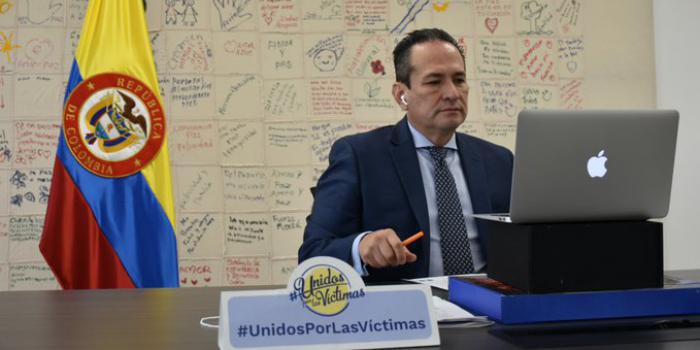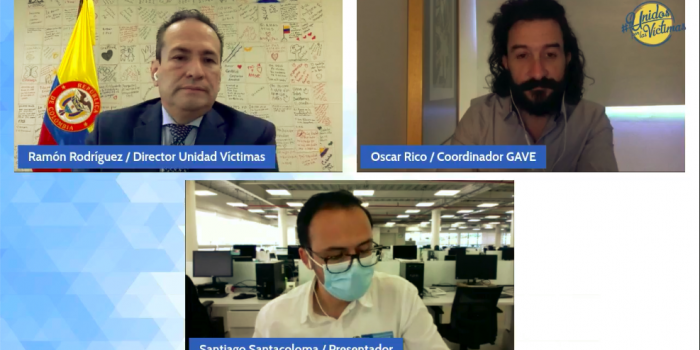
The Unit announced the progress and the actions applied to assist Colombian victims living abroad
In addition to different manners of support, such as psychosocial, in 2020 more than a thousand victims were compensated abroad, 2,612 people have been characterized in eight countries and the registration of those who had to leave the country due to violence has been established.


For more than an hour, the Unit for Victims’ Director, Ramon Rodriguez, along with Victims Abroad Attention Group Coordinator, Oscar Rico, answered questions, doubts and concerns of close to 250 people who attended the Facebook Live event organized by the entity.
In this virtual meeting, the General Director assured that during President Ivan Duque’ Government, progress has been made strengthening support towards victims abroad. "We have made progress applying different actions and measures that seek to contribute to the aid, assistance and reparation of victims abroad," he said.
Within these actions was the opening of the Single Registry for victims abroad, which allows registration regardless of the country where they are and can be done in the Colombian consular mission closest to their residence.
Another action adopted deals with victims’ characterization abroad. Between 2017 and 2020, and with the Norwegian Refugee Council support, the Unit for the Victims developed a process to characterize 2,612 victims in eight countries, which helped identify their most pressing needs.
Faced with the issue of victims abroad characterization, the Director urged Colombians abroad to visit the Unit’s website, where they can refer to the document "Las víctimas del conflicto armado colombiano en el exterior: una caracterización” where thy will find more information.
Regarding victims abroad aid, Oscar Rico, the area’s Coordinator, said the Unit made available, on a permanent basis, the telephone, written and virtual channels for requests and concerns reception. In addition, face-to-face sessions have been held in different countries such as Argentina, Chile, Ecuador, Panama, Venezuela, Costa Rica, the United States, Canada, Spain and France. These events seek on the one hand, to bring the Colombian institutions closer to the victims abroad and on the other, to rebuilding trust.
Likewise, thanks to the Unit and the SNARIV, those who are abroad can access the free issuance of their ID or a copy, the free issuance of the military card, and, last but not least, access to virtual education.
In addition, some alliances have been established with international organizations to aid victims in their residence countries. For example, in 2020, in coordination with the Norwegian Refugee Council, humanitarian aid was delivered in Ecuador and Panama.
As for reparation measures for the victims, the Director stated that in 2020 more than a thousand victims were compensated abroad, reaching a total of 4,000, which equals about 17% of the victims registered abroad.
“La Unidad para las Víctimas en el año 2021 se encuentra desarrollando la Estrategia de Recuperación Emocional en tres países de manera presencial (Ecuador, Costa Rica y España). Desde el año 2020 se desarrolla la estrategia de atención psicosocial no presencial en cualquier país en el que se encuentren víctimas del conflicto armado interno”, puntualizó.
“In 2021, the Unit for the Victims is developing face-to-face Emotional Recovery Strategy sessions in three countries (Ecuador, Costa Rica and Spain). Since 2020, virtual psychosocial care sessions have been developed in any country where internal armed conflict victims are found”, he pointed out.
Finally, the return route includes Humanitarian Assistance provision in Colombia, support for the moving (once it is in Colombia), contributions for food security and the return sustainability. Since the signing of the Final Agreement, the Unit for the Victims has followed an average of 400 returns requests that materialize in effective returns to the national territory.
(End/DFM/COG/RAM)






